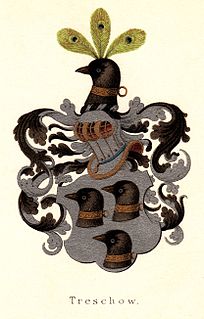
Ljungby Municipality is a municipality in Kronoberg County, southern Sweden, where the town Ljungby is seat.
Astrid is a feminine given name of Scandinavian origin, a modern form of the name Ástríðr. Derived from the Old Norse Ássfriðr, a compound name composed of the elements áss and friðr.
Anders is a name in Scandinavian languages and Fering North Frisian, an equivalent of the Greek Andreas ("manly") and the English Andrew. It originated from Andres via metathesis.
Harald is the Old Norse form of the given name Harold. It's made up the elements Har and (v)aldr.
Ingrid is a Scandinavian, German, and Dutch feminine given name. It continues the Old Norse name Ingiríðr, which was a short form of Ingfríðr, composed of the theonym Ing and the element fríðr "beloved; beautiful" common in Germanic feminine given names. The name Ingrid remains widely given in all of Scandinavia, with the highest frequency in Norway. Norwegian usage peaked in the interbellum period, with more than 2% of newly born girls so named in 1920; popularity declined gradually over the 1930s to 1960s, but picked up again in the late 1970s, peaking above 1.5% in the 1990s.
Eskil Magnusson was the lawspeaker of Västergötland in Sweden c. 1215–1227, and is the first attested lawspeaker in what is now Sweden about whom we have any extensive information.
Andreas is a name usually given to males in Austria, Greece, Cyprus, Denmark, Armenia, Finland, Flanders, Germany, Norway, Sweden, Switzerland, Italy, Romania, the Netherlands, and Indonesia. The name derives from the Greek noun ἀνήρ anēr – with genitive ἀνδρός andros –, which means "man". See the article on Andrew for more information. The Scandinavian name is earliest attested as antreos in a runestone from the 12th century.
Sven is a Scandinavian first name which is also used in the Low Countries and German-speaking countries. The name itself is Old Norse for "young man" or "young warrior". The original spelling in Old Norse was sveinn. Over the centuries, many northern European rulers have carried the name including Sweyn I of Denmark. An old legend relates the pagan king Blot-Sven ordered the execution of the Anglo-Saxon monk Saint Eskil.

Saint Eskil was an Anglo-Saxon monk particularly venerated during the end of the 11th century in the Province of Södermanland, Sweden. He was the founder of the first Diocese of the lands surrounding Lake Mälaren, today the Diocese of Strängnäs. He is the patron saint of Södermanland and the Diocese of Strängnäs.

The given name Eric, Erich, Erik, or Erick is derived from the Old Norse name Eiríkr. The first element, ei- is derived either from the older Proto-Norse *aina(z), meaning "one, alone, unique", as in the form Æinrikr explicitly, or from *aiwa(z) "everlasting, eternity". The second element -ríkr stems either from *ríks "king, ruler" or from the therefrom derived *ríkijaz "kingly, powerful, rich, prince". The name is thus usually taken to mean "sole ruler, autocrat" or "eternal ruler, ever powerful".

Kjell is a Scandinavian male given name. In Denmark, the cognate is Kjeld or Keld. The name comes from the Old Norse word kętill, which means "kettle" and probably also "helmet" or perhaps "cauldron". Examples of old spellings or forms are Ketill, Kjætil and Ketil. An equally likely meaning is a source, a hope that the boy will get ample resources to draw upon later in life.
Johan is a masculine given name of Hebrew origin. It is a shortened form of the Hebrew name יְהוֹחָנָן (Yəhôḥānān), meaning "God is gracious", and uncommon as a surname. Johan is also a masculine given name of Malay language origin, meaning "Champion".
Dahlström, Dahlstrom or Dalström is a Swedish surname, Norwegian version is Dahlstrøm. It derives from the Swedish/Norwegian words dal which means valley and ström/strøm which means stream.
Ole Eskild Dahlstrøm is a former professional Norwegian ice hockey player.

Treschow is a family originating in Denmark and with branches in Norway and Sweden. The family name means "wooden shoe-maker" and the family later counted many merchants in the 17th century and priests in the 18th century. A member of the family, Michael Treschow, bought the status of untitled (lower) nobility in Denmark in 1812, although Norway, where he was resident, abolished the concept of nobility only a few years later. Members of this family have been industrialists and landowners, notably in Vestfold.
Inger is a Scandinavian feminine given name, originally short for a name in Ing-, either Ingrid or Ingegerd.
Winge is a surname. Notable people with the surname include:
Ebbesen is a Danish-Norwegian patronymic surname meaning "son of Ebbe". Notable people with the surname include:
Tone, Tóne or Þone is a given name, nickname and a surname. Tone is a Slovene masculine given name in use as a short form of Anton in Slovenia. It is also a Danish, Finnish, Norwegian and Swedish feminine given name used as an alternate form of Torny and a short form of Antona in Norway, Sweden, Finland, Republic of Karelia, Estonia, Greenland and Denmark. Tóne is a Portuguese masculine given name in use as a diminutive of Antônio and António in Portugal, Brazil, South Africa, Namibia, Angola and Mozambique. Þone is an Old Norse feminine given name that is used as a form of Torny in parts of Norway, Sweden, Iceland, France, England and Scotland as well as in Denmark.




